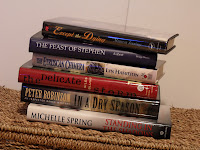
Libraries and me!
I stopped into my local branch of the Ottawa Public Library last night to pick up some books I'd reserved - research for my novel. And, being a recent convert to opera, I've been borrowing one opera DVD a week...so had to get my next fix. It's going to take me a long time to work through them but I think my library is up to the challenge.
What amazed me, and most pleasantly, was how crowded the library seemed on a Thursday evening. The parking lot was full, for starters, so I had to park in back (it was raining). And, there seemed to be people standing in front of all the shelves I went to, all the computers were in use, and everywhere I looked, people of all ages.
This is wonderful news for writers! Sure, a lot were kids doing homework, but they're in the library, researching and reading...right?
 My relationship with libraries goes back many, many years. My first library experience was the wonderful & typical Carnegie building in my hometown. It was right out of a book and a place of awe to someone so young. It still stands but has had many name changes over the years.
My relationship with libraries goes back many, many years. My first library experience was the wonderful & typical Carnegie building in my hometown. It was right out of a book and a place of awe to someone so young. It still stands but has had many name changes over the years.When I was a high school lass, just a few years ago, I had a part-time job as a 'page' in the New Westminster Public Library. I used to love Friday night shifts because I was usually assigned to the reference department and it was never busy at that time, so I could sit and read the New York Times. My Saturday shifts kept me hopping though. And, we didn't have branches, even though the city was large enough to support them. I thoroughly enjoyed the job, shelving the books, helping process the new acquisitions for circulation, working at the circulation desk (no automated processes in those days), and when the librarian on duty was busy, helping a patron or two.
As a bookseller, I looked on libraries as partners in selling. Many readers cannot afford to buy their own copies of a new title, if they're unsure of enjoying the read. But, they can borrow the book and, if it's a hit, go on to buy subsequent books in the series. Many libraries also host book clubs and are happy to invite authors to participate in meetings.
We all want the same thing -- readers reading our books. So, back to last night. I'd bet some of them were sitting in those comfy chairs reading a mystery. Or checking a mystery title out.

Let's hear it for libraries, librarians, and even pages (if that's what they're still called). And yes, let's get a newer, state-of-the-art (books) main branch built in this city.
What's happening with your local library?
Linda Wiken/Erika Chase






























.jpg)

















